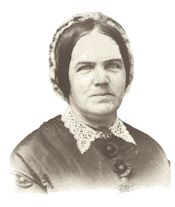July 26th.—Isabella went with me to the bulletin-board. Mrs. D. (with the white linen as usual pasted on her chin) asked me to read aloud what was there written. As I slowly read on, I heard a suppressed giggle from Isabella. I know her way of laughing at everything, and tried to enunciate more distinctly—to read more slowly, and louder, with more precision. As I finished and turned round, I found myself closely packed in by a crowd of Confederate soldiers eager to hear the news. They took off their caps, thanked me for reading all that was on the boards, and made way for me, cap in hand, as I hastily returned to the carriage, which was waiting for us. Isabella proposed, “Call out to them to give three cheers for Jeff Davis and his generals.” “You forget, my child, that we are on our way to a funeral.”
Found my new house already open hospitably to all comers. My husband had arrived. He was seated at a pine table, on which someone had put a coarse, red table-cover, and by the light of one tallow candle was affably entertaining Edward Barnwell, Isaac Hayne, and Uncle Hamilton. He had given them no tea, however. After I had remedied that oversight, we adjourned to the moonlighted piazza. By tallow-candle-light and the light of the moon, we made out that wonderful smile of Teddy’s, which identifies him as Gerald Grey.
We have laughed so at broken hearts—the broken hearts of the foolish love stories. But Buck, now, is breaking her heart for her brother Willie. Hearts do break in silence, without a word or a sigh. Mrs. Means and Mary Barnwell made no moan—simply turned their faces to the wall and died. How many more that we know nothing of!
When I remember all the true-hearted, the light-hearted, the gay and gallant boys who have come laughing, singing, and dancing in my way in the three years now past; how I have looked into their brave young eyes and helped them as I could in every way and then saw them no more forever; how they lie stark and cold, dead upon the battle-field, or moldering away in hospitals or prisons, which is worse—I think if I consider the long array of those bright youths and loyal men who have gone to their death almost before my very eyes, my heart might break, too. Is anything worth it—this fearful sacrifice, this awful penalty we pay for war?
Allen G. says Johnston was a failure. Now he will wait and see what Hood can do before he pronounces judgment on him. He liked his address to his army. It was grand and inspiring, but every one knows a general has not time to write these things himself. Mr. Kelly, from New Orleans, says Dick Taylor and Kirby Smith have quarreled. One would think we had a big enough quarrel on hand for one while already. The Yankees are enough and to spare. General Lovell says, “Joe Brown, with his Georgians at his back, who importuned our government to remove Joe Johnston, they are scared now, and wish they had not.”
In our democratic Republic, if one rises to be its head, whomever he displeases takes a Turkish revenge and defiles the tombs of his father and mother; hints that his father was a horse-thief and his mother no better than she should be; his sisters barmaids and worse, his brothers Yankee turncoats and traitors. All this is hurled at Lincoln or Jeff Davis indiscriminately.










